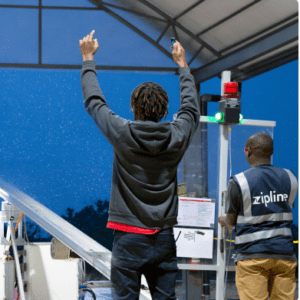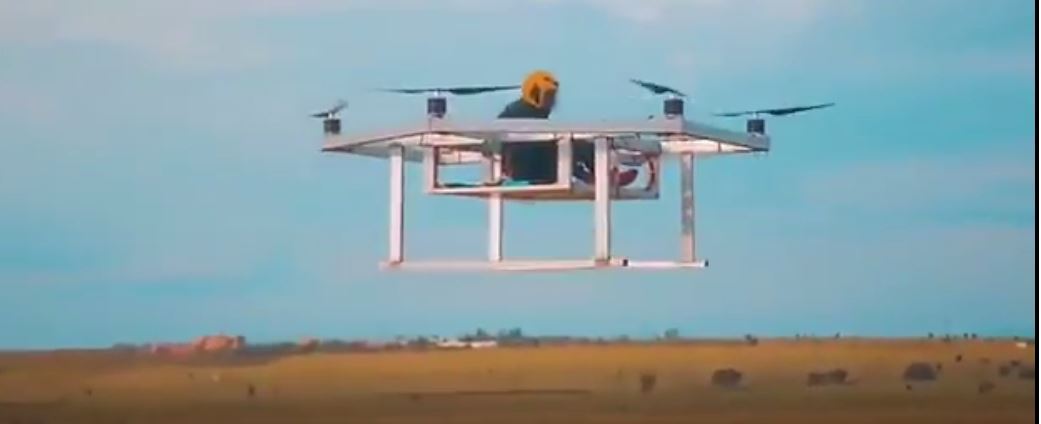Drones are flying robots that can be remotely controlled or flown autonomously by software-controlled flight plans, in conjunction with onboard sensors and a global positioning system (GPS).
The drone or Unmanned Aerial Vehicle (UAV) industry in Africa is taking off, evolving into a massive enterprise. People have begun to recognise the many benefits of using UAVs for commercial and non-commercial purposes.
Drones offer advantages adapted to the local reality through ease of navigating the large-sized territories, low costs of use, rapidity of airway transportation etc. In some African countries, infrastructure, especially roads in rural areas, can hinder access to services, commerce and transport. Under certain conditions, UAVs can help overcome this lack of infrastructure, and investing in UAV technology could help meet Africa’s demands more efficiently and cost-effectively.
Drone technology usage is growing across Africa. Some of the countries with significant promise include:
Burkina Faso
FasoDrone is a drone system design and aerial data processing company based on artificial intelligence. It provides timely and accurate data for quick and profitable decisions with low risk. It offers solutions to actors in agriculture, mining, building and public works (BTP), urban development, environmental protection, and media. It is based in Burkina Faso.
Kenya
Different usage of this technology has emerged. Transportation is vital, with Morris Mbetsa (a self-taught electrical engineer) developing an unmanned passenger drone in 2018. This drone is capable of transporting tourists over Nairobi. Other companies including Flying Labs and Astral Aerial deploy Drones to render different services such as mapping, product delivery, rapid response, situational awareness, surveying and data analysis, agricultural services etc. In acknowledgement of the growth in drone technology, the government is organising The Kenyan Drone Business Competition 2022 (KDBC) with 25 competitors for the best drone innovation in the country.
Morocco
This country has significant innovation with these drones. AtlanSpace won the innovation award of the African Entrepreneurship Award launched by the BMCE in 2017 after benefiting from financial support from Microsoft, the UN Organisation for Industrial Development, and the Moroccan government. The company focuses on preserving the environment through artificial intelligence-driven by drones. The aerial surveillance system by smart drone was conceived to combat harmful phenomena targeting Moroccan and African sea resources like illegal fishing, surface sea activities, and oil discharging in the oceans.
Similarly, Delta Drone – a significant player in the sector listed on Euronext, has been set up in this country. Their specialisation include services related to the safety and security of industrial facilities. Its clients OCP, Glencore, Anglo-American, Anglo-Gold Ashanti, Exxaro, South 32, Newmont and Rössing Uranium and even ECOWAS.
Niger
The company Drone Africa Service focuses on the production of civilian drones (differing from military drones) dedicated to aerial photography and other services. Different sectors are targeted: agriculture, environment, protected areas surveillance, prevention and risks and disasters managing, construction industry, communication, tourism, etc. The startup aims at becoming the leader of aerial imagery in West Africa.
Nigeria

Drone technology is evolving with various usage and overall technology innovations in Nigeria. For example, Zenvus uses electronic sensors to collect soil, monitor the health status of the field and detect drought and pests. LifeBank won a sum of $250, 000 as part of its drive to deploy drones for medical supplies, while UAS Innovations & Solutions is interested in survey and surveillance. In acknowledgement, the government is supporting the idea of local manufacture of drones to support the evolution of its adoption.
Rwanda

A partnership between the Silicon Valley company Zipline and the Rwandan government created an innovative device in 2016. This device is crucial to Rwanda’s health sector, like hospitals and medical centres can order blood bags in emergency cases and have them delivered by drones. Zipline delivers blood, drugs, vaccines, and other medical supplies to health centres in remote areas. The Zipline drones can bear up to 1.5kgs cargo and go up to a 90km/h speed. Geo-tracked, the device is monitored and programmed to deliver the cargo in a perimeter around the order area.
South Africa
South Africa is advanced in its drone technology, with some industry watchers advising exportation of services. Services using this technology are numerous, with different players offering bespoke and generic services. Some companies include Integrated Aerial Systems, Drone Fishing, Passerine Aircraft Corporation, Aerobotics, Revolute Systems etc. Services rendered include public infrastructure monitoring, security surveillance, survey & mapping, advanced data analysis, fishing, AI-enabled pest detection, disease detection, etc. It is a mature industry with deep investment and competition.
Zambia
i-Drones Services Limited company was created in late 2016. It uses drones to monitor farms and take decisions to improve their yield. The company has a specific initiative, the “Idrone4ag youth project”, whose purpose is to train and educate young people even in rural areas on the use of drones. The long-term objective is to create jobs and improve Zambia’s agricultural sector.
Despite the increasing adoption, regulation becomes a significant issue for deployments across the continent. This will be discussed in Part 2 of this article.
















